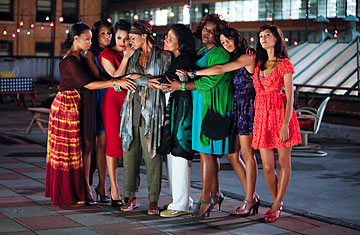
From left, Anika Noni Rose, Kerry Washington, Janet Jackson), Kimberly Elise, Phylicia Rashad, Loretta Devine, Tessa Thompson and Thandie Newton in For Colored Girls.
In its first pages, Ntozake Shange's passionate 1975 play For Colored Girls Who Have Considered Suicide When the Rainbow is Enuf posed a question about its seven main characters, all black women who have survived abuse or trauma. "Are we ghouls? children of horror? the joke?" Those seven ladies, identified only by colors, were fierce in their pain and powerful in both their rage and healing. Thirty-five years later, Shange's prose still begs to be read aloud; you want to feel those words in your mouth. Her eloquent women were no joke.
But Tyler Perry's movie version of Shange's play, its title shortened to For Colored Girls does feel like a ghoulish joke, a dated horror show bordering on parody. It's both operatic and tone deaf, with explosions of hysteria that include a drunken Macy Gray performing a back-alley abortion and the conversion of a poem spoken by Shange's Lady in Purple into an actual opera by Perry's regular composer Aaron Zigman (called La Donna In Viola). During the opera, the film cuts back and forth between a doomed couple silently watching the performance (the husband is on the down low, unbeknownst to the wife) and another character being savagely date-raped. It is an agony of melodrama.
This is a shame, because there are some fine actresses in this large ensemble cast, and when each gets her chance — in tight close-up — to deliver monologues constructed from Shange's poetry, you're temporarily jolted out of your conviction that this is the most astonishingly hammy and misguided production of the year. From this bad movie, someone could make a great, if odd, short film.
The seven colored girls in the title of Shange's play addressed us from the outskirts of cities like Chicago, Detroit, Houston and Baltimore, but most of Tyler's characters speak to us from Harlem. Perry has built a narrative that revolves around an apartment building, which is home to a cranky nymphomaniac named Tangie (Thandie Newton), a sanctimonious building manager named Gilda (Phylicia Rashad), a fellow named Frank (Richard Lawson), whose oft-dumped girlfriend Juanita (Loretta Devine) drops by to shriek at his locked door and Crystal (Kimberly Elise, who starred in Perry's Diary of a Mad Black Woman). Crystal spends her days working as an editorial assistant at a fashion magazine run by chilly, bitchy Jo (Janet Jackson) and then comes home to physical abuse at the hands of Beau Willie (Michael Ealy), the father of her two insanely adorable children. Elise's performance is the only restrained one in the film and her Crystal is For Colored Girls' most compelling character, despite being subjected to a dramatic scenario so blatantly manipulative that even Jodi Picoult might have refused to go there.
Others featured in the cast include Tessa Thompson as Nyla, Tangie's teenage sister, and a disappointing Whoopi Goldberg as Alice, their lunatic cult member mother. (Perry's director's notes to Goldberg must have been along the lines of "mean zombie.") Even more peripheral are Kerry Washington as an infertile social worker desperate for a baby (in the recent Mother and Child she was an infertile baker desperate for a child) and Nyla's dance teacher (Anika Noni Rose) who is introduced as annoyingly chipper and then — bring on the audience guilt for wanting her to shut up about the joys of Salsa — brutally abused before our eyes. It goes without saying that nearly every male character here is a stock negative stereotype; the closest thing to a nice guy in this cast is an insensitive police officer.
This is, to the best of my knowledge, the first Tyler Perry movie to be screened in advance for the press, an indication presumably of his excitement over the film, which is certainly a departure from his customary boisterous comedies. (It's a boisterous bummer.) Perry doesn't need critical acclaim — he's the most successful black filmmaker of all time, with an audience that shows up no matter what — but I would have enjoying giving him some for For Colored Girls. There is no question that he loves the material as much as anyone. He'll introduce Shange's play to a new generation and there is absolute value in that. But For Colored Girls feels like the cinematic equivalent to putting a garish reproduction of the Sistine Chapel on the ceiling of your McMansion and calling it art.
